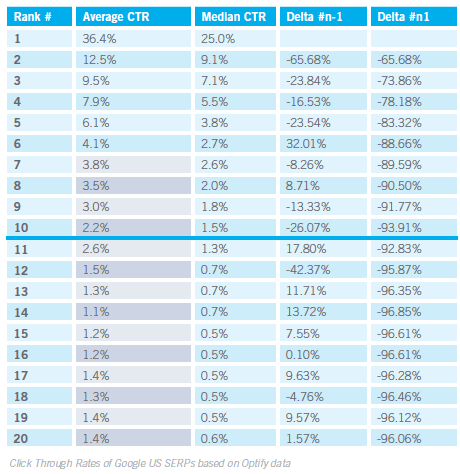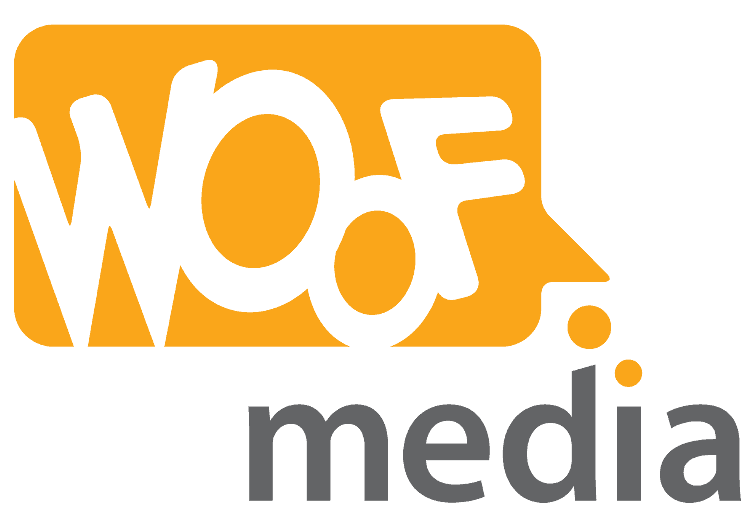Understanding Search Engine Optimisation (SEO)
Research suggests that the top 3 Google organic search results represent 58.4% of click-throughs from Internet users - Research obtained from Optify, Marketing in Real Time.
Benefits of Ranking on Page 1
It can be seen from the below graph that the top result receives approximately 36.4% click throughs, with second and third results achieving 12.5 and 9.5% click throughs respectively.
What does this mean for your business you may ask? Well, it's simple... if you are not appearing in the top 3 search results (or even on the first page), then the opportunity of obtaining traffic to your website from search engines is limited.
How do I get on Page 1 of search results?
Search Engine Optimisation, or SEO as it is commonly referred, is about getting highly targeted traffic to your website that converts to sales. It is the process of improving the structure and content of your website, so that it has the best opportunity to rank highly in search engine results, and therefore attract a higher percentage of click-throughs to your site.

As the powerhouse search engine of our time, Google now has the capacity to crawl websites with a more human approach. Whereby, if businesses want to be found through organic search, they really need to manage a truly relevant, dynamic website. Gone are the days of creating a web page and leaving it for months (or years!) without change... if we do that these days, it's highly likely that no one will find it, as Google will simply ignore it.
Check out this YouTube video from one of Google's employees as he demonstrates how Google searches for webpages to list into organic search results.
Paid vs organic search results
Some businesses choose to engage pay-per-click advertising through Google Adwords to obtain increased click throughs to their website, and therefore increased traffic to their website.
There are some advantages to paid advertising, including the guarantee of being listed on the first page, however it does come at a cost. The image below suggests that the organic search results actually receive a lot more click through potential (70-75%) than that of paid listing (25-30%). Therefore, it would be far better to advance an SEO strategy to determine organic results potential, prior to developing a PPC campaign.
Capturing lost opportunity by using SEO
There are several techniques involved in executing strategic SEO.
Identifying relevant keywords
The identification of relevant keywords (and strategic placement of these keywords throughout the site) is an essential part of the SEO process.
Often websites will receive the majority of traffic from search engines from people typing in keywords of the business' name. To find our website people might type in 'WOOF Media' as that is what our business name is. This is great... however, that means the website is only capturing those people who already know our business.
An optimised website, however, will ensure people find a business based on keywords, rather than known business reputation, eg. to find our website, people might type in 'tourism website designer in South Australia'.
Undertaking SEO optimisation can provide additional opportunities for online engagement and potential sales conversion, through capturing the interest of those who are looking for your product but don't know your business.
Content is king
As with most marketing material content is king; especially since it is the content on websites that Google uses to determine whether it will rank highly in it's search results.
The copy on your website needs to reflect your identified keywords, as well as make sense. There are several strategies and techniques with regard to keyword placement that can be implemented to ensure that your copy is designed best for search engines.
It is also important that the copy on your website is also relevant to your product/service. As mentioned about, Google will only present your website in search results if it believes that the content you are displaying is relevant.
Updating your content regularly is also essential as Google gets bored and needs to be reminded why it has placed your website in organic search results - so make sure you give it good reason to keep your site right up the top of the rankings!
Ethical, and Quality Link Building
By link building, we don't mean trying to get reciprocal links with as many random websites as possible, or having a specific 'Links' page on your website.
Link building refers to 'inlinking', which is how many relevant external sites are linking to your website; and 'intext linking' which refers to adding hyperlinks to keywords or phrases in your website copy to refer to other pages in your site. This not only creates excellent online clout (leveraging the success of other websites), but also shows that you are producing relevant content, thereby being a expert in the field of certain keywords.
Measuring SEO performance
It is essential that businesses have a good understanding of their website's performance through a measurement tool, like Google Analytics.
If you do measure your website's performance you will have an idea about how people are currently finding your site and what they are doing whilst they are visiting. If you have a low percentage of people finding your site through search engines, (particularly if people are only finding you through search engines via your business name, not target keywords) then you probably need to work on your SEO.
How can WOOF Media assist you with your website's SEO?
Our team can assist tourism businesses with their SEO by undertaking a digital marketing audit, writing or refining website copy that is optimised for specific target audiences, and implementing the copy into your website.
